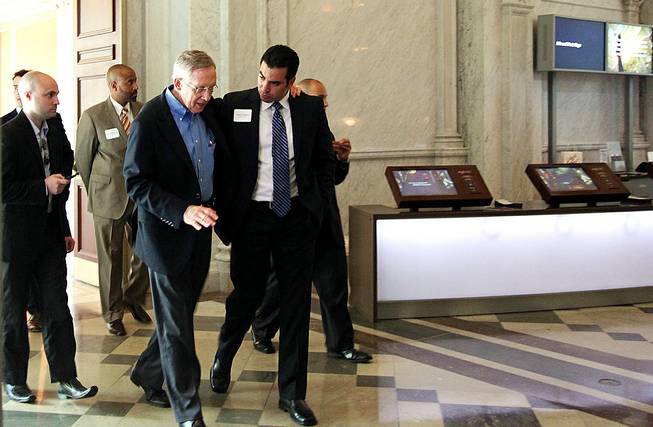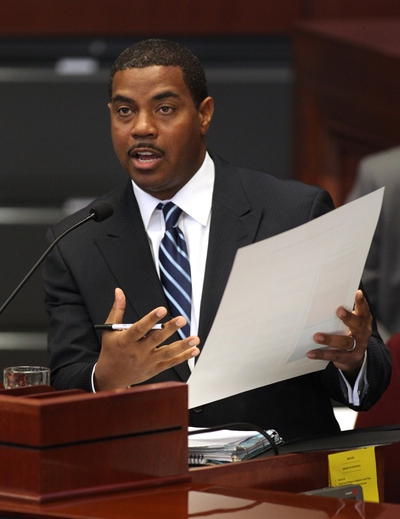
Senate Majority Leader Harry Reid walks out of a luncheon for Nevada lawmakers visiting Washington, D.C., at the Library of Congress with his arm around State Sen. Ruben Kihuen on Saturday, July 23, 2011.
Saturday, July 30, 2011 | 2 a.m.
Sun Coverage
Sun Archives
In 2008, blacks and Hispanics turned out in record numbers in Las Vegas to vote for the first nonwhite president of the United States.
Next year, both racial groups stand the chance of making that kind of history again by electing Nevada’s first nonwhite representative to Congress.
But doing so may pit minority against minority, and threaten to cause a primary divide between the two most crucial blocs of Democrats’ voting base.
At the center of this are two possible candidates who Democrats in Nevada and in Washington, D.C., are taking a serious look at — state Sens. Ruben Kihuen, who is Hispanic, and Steven Horsford, who is black.
Both are rising stars in the Nevada Democratic establishment.
But redistricting may leave only enough room for one to secure a strong political base.
Kihuen and Horsford each got a chance to test the waters and answer some questions last week when they visited Washington with a delegation of Nevada Democrats to the nation’s capital.
Horsford, who also came for a meeting of the Democratic National Committee, said he spent his time consulting with close friends, confidantes and various contacts, including the chairman and top recruiters at the Democratic Congressional Campaign Committee.
"He seems like a terrific candidate with exactly the kind of skills and talent we need in the Congress," said Maryland Rep. Donna Edwards, a chairwoman of the party’s Red to Blue recruiting program and a member of the Congressional Black Caucus.
Kihuen appeared to be pounding the pavement even harder, meeting with the DCCC’s chairman, influential Hispanic leaders in Congress and lobbyists to rally a base of future supporters and financial boosters.
"He has a great reputation and good heart ... I really hope he’s seriously considering this," said New Mexico Rep. Ben Ray Lujan, a member of the Congressional Hispanic Caucus who is in charge of recruiting candidates to make congressional bids. "It would be great to have someone of his caliber and his reputation. People are asking him to run ... I think that speaks volumes."
Kihuen made sure to grab face time with Harry Reid as well.
"I just told Ruben I’ll help him however I can," Reid said after whispering briefly with Kihuen outside a lunch for Nevada visitors in the Library of Congress. He said he advised Kihuen to be measured and deliberative as possible in reaching a decision.
Horsford left Reid alone, citing the debt crisis.
While Horsford and Kihuen may be equally poised to make history on the basis of their race, racial affiliation seems to play a different role in each man’s campaign-building.
Rep. John Lewis of Georgia, a famed civil rights advocate who came to Las Vegas last year to campaign for Harry Reid, knows Horsford but said he didn’t realize he was in town. "He’s a wonderful, wonderful young man," Lewis said of Horsford. "Whatever he decides to do, he would be wonderful."
It also didn’t appear that Horsford reached out to Rep. Jim Clyburn, an assistant Democratic leader who’s also heavily involved in recruiting candidates.
"It’s always good to do historic things, but I would have to speak with him first,” Clyburn said.
Meanwhile, D.C.’s top Hispanic brass were tripping over themselves to sing Kihuen’s praises after giving him an audience.
“I think he’d make a model member of Congress at a time when Nevada really needs some strong leadership,” said Xavier Becerra, vice chairman of the House Democratic Caucus. Additionally, Kihuen’s candidacy “probably helps a lot of other candidates (in Nevada) who will need to have the Latino vote as well.”
While it’s important to avoid generalizing in discussions of race, the political climate surrounding the two minority groups Kihuen and Horsford represent seem at odds.
Las Vegas’ Latino population is quite large. In the 2010 census, people of Hispanic origin accounted for more than 26 percent of Clark County’s population, which grew more than 80 percent in the last decade. The county’s African American population grew almost as fast but is significantly smaller, at about 8 percent.
“The African-American community (of Las Vegas) is unified and vibrant,” said Michael Green, a professor of history at the College of Southern Nevada. “But it never reached the percentile the Hispanic community has.”
The African American community is also more established than the Latino community, a fact that actually functions as a negative for drumming up political enthusiasm and attention for black candidates.
"In some respects, African Americans are taken for granted more, because they’re the most loyal,” said David Damore, a UNLV professor of political science. Latinos, on the other hand, "are bigger. And they’re new. So if you have new people involved...it’s exciting — a community that’s gone from not getting that much attention to now being the belle of the political ball."
Community leaders and scholars of race relations say the climate leading up to 2012 still favors Democrats putting more effort and investment behind Latino candidates over African American ones in places like Nevada, if it ends up being a choice between the two.
It’s not just that the Latino population is growing faster, it’s that even if "Hispanic issues are American issues," candidates know Hispanics have a special interest in a subset of ethnically relevant federal issues that invariably crop up every campaign season — and the party needs their votes.
“The effort to repeal the 14th Amendment ... The lack of comprehensive immigration reform ... The Dream Act ... We need a strong Hispanic candidate to push for those issues,” said Fernando Romero, president of the nonpartisan activist group Hispanics in Politics.
When pressed to explain why, Romero paused.
“Mr. Obama must deliver. And he has not. That’s basically all I can say,” Romero said. “Again, that makes it really a major reason why we need somebody like Ruben Kihuen.”
To African Americans, though, Obama is already the ultimate symbol of political achievement.
"Horsford would be the first black congressman, but in a way, Obama’s already taken some of that energy away from him,” said Rainier Spencer, director of the Afro-American Studies program at UNLV.
The best possible situation, Spencer and Romero agreed, is if voters don’t have to make a choice.
When drafting their redistricting map, Hispanic leaders left Horsford’s base in the 1st Congressional District and pulled the bulk of Kihuen’s into CD3.
"We wanted to have a Hispanic district and allow, obviously, the African American community to be able to support and have a candidate," Romero said.
If that split happens, Kihuen would face the more difficult battle — assuming both get through a primary, that is. CD1 is pretty solidly Democratic; whoever runs in CD3 will have to go up against incumbent Republican Rep. Joe Heck in what’s always been a swing district.


Join the Discussion:
Check this out for a full explanation of our conversion to the LiveFyre commenting system and instructions on how to sign up for an account.
Full comments policy